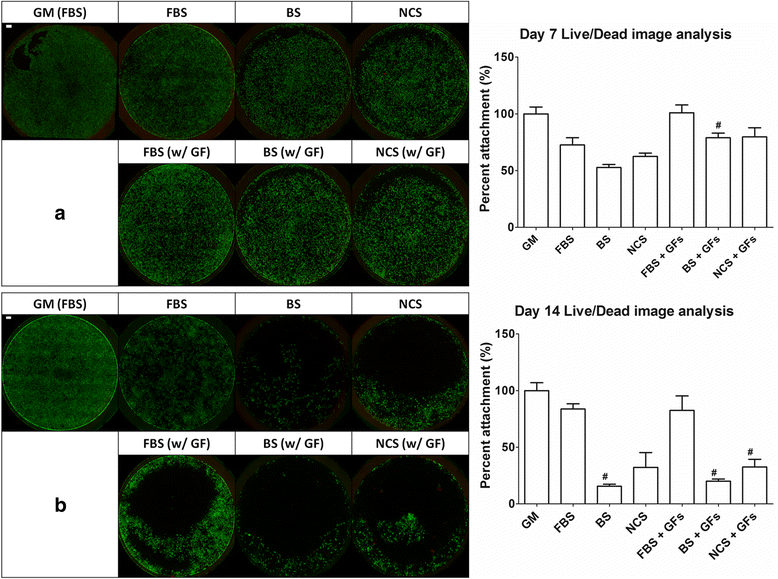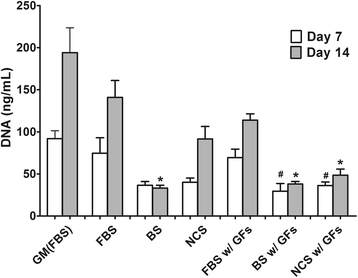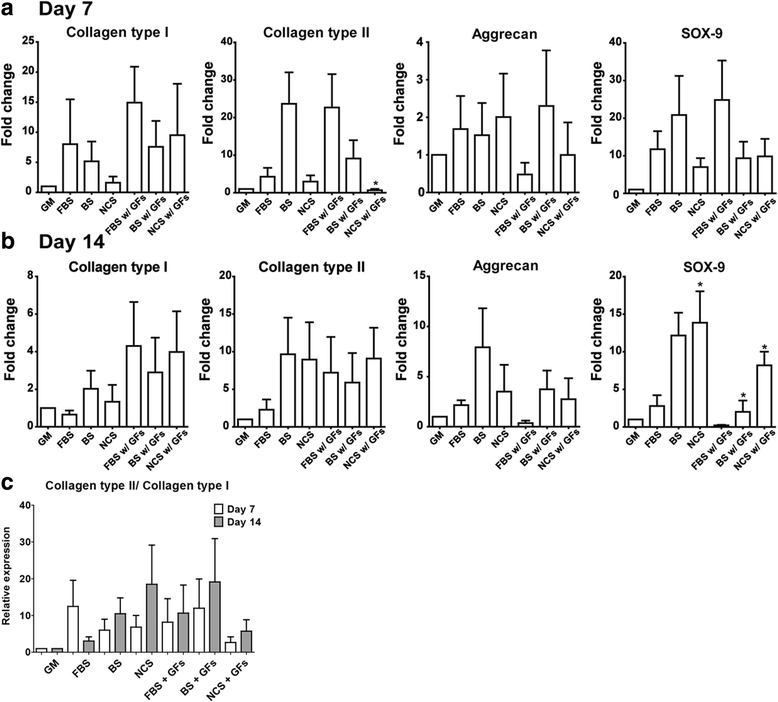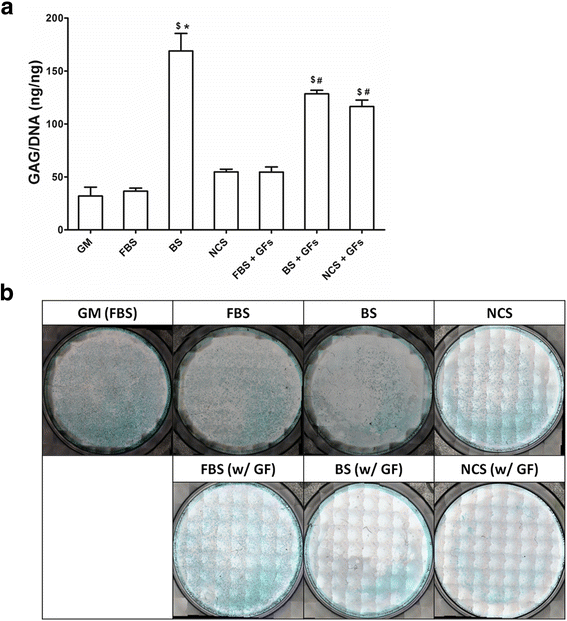The effect of serum types on Chondrogenic differentiation of adipose-derived stem cells
- PMID: 29556415
- PMCID: PMC5845156
- DOI: 10.1186/s40824-018-0116-z
The effect of serum types on Chondrogenic differentiation of adipose-derived stem cells
Abstract
Background: Fetal bovine serum (FBS) is the most essential supplement in culture media for cellular proliferation, metabolism, and differentiation. However, due to a limited supply and subsequently rising prices, a series of studies have investigated a biological feasibility of replaceable serums to substitute FBS. Along with the increasing interests to manufacture stem cell-based cellular products, optimizing the composition of culture media including serums and exogenous growth factors (GFs) is of importance. In this experiment, the effect of bovine serum (BS) and newborn calf serum (NCS) on proliferation and chondrogenic differentiation capacity of human adipose derived stem cells (ADSCs) was evaluated, especially in the chondrogenically supplemented culture condition.
Methods: ADSCs were chondrogenically cultured with FBS, BS, and NCS for 14 days. For the acceleration of in vitro chondrogenesis, exogenous insulin-like growth factor and transforming growth factor-β3 were added. Viability and proliferation of ADSCs were evaluated using Live/Dead fluorescence staining and DNA amount, respectively. To investigate a chondrogenic differentiation, a series of assays were performed including a quantification of glycosaminoglycan deposition, alcian blue staining, and RT-PCR analysis for type II collagen, aggrecan and Sox-9 genes.
Results: The results demonstrated that proliferation of ADSCs was facilitated in FBS condition as compared with other serum types. For chondrogenic marker gene expression, serum substitutes enhanced Sox-9 expression level on day 14. The deposition of glycosaminoglycan was more facilitated in BS condition regardless of additional chondrogenic GFs.
Conclusion: It could be presumably speculated that serum types and exogenous supplements of GFs could also be important parameters to optimize culture media composition, especially in order to maintain the enhanced levels of both proliferation and chondrogenic differentiation of ADSCs during expansion.
Keywords: Adipose derived stem cell; Chondrogenic differentiation; Fetal bovine serum; Serum substitutes.
Conflict of interest statement
Not applicable.Not applicable.The authors declare that they have no competing interests.Springer Nature remains neutral with regard to jurisdictional claims in published maps and institutional affiliations.
Figures





References
-
- Lai JH, Rogan H, Kajiyama G, Goodman SB, Smith RL, Maloney W, Yang F. Interaction between osteoarthritic chondrocytes and adipose-derived stem cells is dependent on cell distribution in three-dimension and transforming growth factor-beta3 induction. Tissue Eng A. 2015;21(5–6):992–1002. doi: 10.1089/ten.tea.2014.0244. - DOI - PMC - PubMed
-
- Waters HA, Geffre CP, Gonzales DA, Grana WA, Szivek JA. Co-culture of adipose derived stem cells and chondrocytes with surface modifying proteins induces enhanced cartilage tissue formation. Journal of investigative surgery : the official journal of the Academy of Surgical Research. 2013;26(3):118–126. doi: 10.3109/08941939.2012.728681. - DOI - PubMed
-
- Jo CH, Lee YG, Shin WH, Kim H, Chai JW, Jeong EC, Kim JE, Shim H, Shin JS, Shin IS, Ra JC, Oh S, Yoon KS. Intra-articular injection of mesenchymal stem cells for the treatment of osteoarthritis of the knee: a proof-of-concept clinical trial. Stem Cells. 2014;32(5):1254–1266. doi: 10.1002/stem.1634. - DOI - PubMed
-
- Kim YS, Koh YG. Injection of mesenchymal stem cells as a supplementary strategy of marrow stimulation improves cartilage regeneration after lateral sliding calcaneal osteotomy for Varus ankle osteoarthritis: clinical and second-look arthroscopic results. Arthroscopy. 2016;32(5):878–889. doi: 10.1016/j.arthro.2016.01.020. - DOI - PubMed
LinkOut - more resources
Full Text Sources
Other Literature Sources
Research Materials
Miscellaneous

